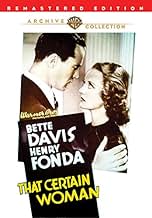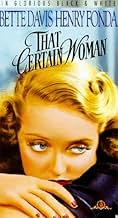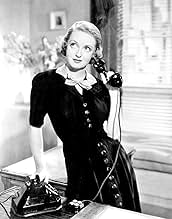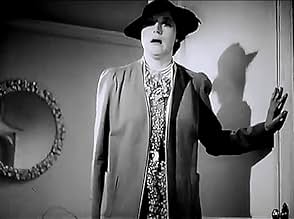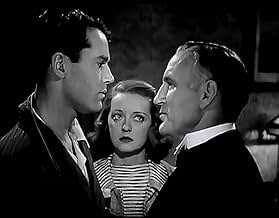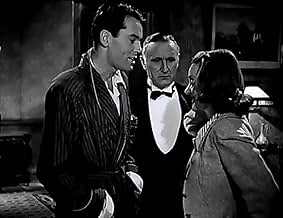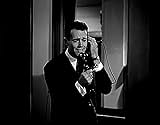IMDb RATING
6.4/10
1.8K
YOUR RATING
Mary Donnell, a young legal secretary with a past, elopes with a client's son, but his father has the marriage annulled without knowing she's pregnant.Mary Donnell, a young legal secretary with a past, elopes with a client's son, but his father has the marriage annulled without knowing she's pregnant.Mary Donnell, a young legal secretary with a past, elopes with a client's son, but his father has the marriage annulled without knowing she's pregnant.
- Awards
- 1 win total
Katharine Alexander
- Mrs. Rogers
- (as Katherine Alexander)
Mary Philips
- Amy
- (as Mary Phillips)
Richard DeNeut
- Boy
- (as Dickie DeNeut)
John Hamilton
- American
- (scenes deleted)
Edward Keane
- Opposing Counsel
- (scenes deleted)
- Director
- Writer
- All cast & crew
- Production, box office & more at IMDbPro
Featured reviews
I actually liked this picture. The story loosely parallels that of Madame Butterfly...and if you see it in that light, it doesn't seem all that over the top. I wouldn't be a bit surprised if the writer had the idea of updating Madame Butterfly...I visually these guys in wrinkled shirtsleeves bending over their old Royal typewriters chomping on cigars..."Yeah...Madame Butterfly...that's the ticket...only she's not a prostitute, that won't work....but a fallen woman...but a noble one....she's a bootlegger's widow...yeah! that's the ticket...she marries a playboy, he dumps her, marries someone else...she waits for him....keep the faithful maid in the plot...has a kid....the husband comes back...remarried....she sends the kid off to live with her ex and then offs herself....yeah! It'll be a hit! Not a dry in the house."
I actually realized the similarity only in the last 15 minutes of the film when I got that awful yet familiar feeling in the pit of my stomach which always anticipates a mother's pending self-sacrifice. When Butterfly sees the American wife for the first time standing outside her little house on hill in Japan and realizes who she is and why she's there...it's really heartbreaking.
Anyway, despite the melodrama, the performances That Certain Woman are really very good, especially Davis's. She was a very intelligent actress, and understood what the camera would catch.
So, maybe you don't need to OWN this video, but I wouldn't disregard it entirely. Then go out and rent Frédéric Mitterrand's beautiful 1995 film of the opera. Heart-wrenching...
I actually realized the similarity only in the last 15 minutes of the film when I got that awful yet familiar feeling in the pit of my stomach which always anticipates a mother's pending self-sacrifice. When Butterfly sees the American wife for the first time standing outside her little house on hill in Japan and realizes who she is and why she's there...it's really heartbreaking.
Anyway, despite the melodrama, the performances That Certain Woman are really very good, especially Davis's. She was a very intelligent actress, and understood what the camera would catch.
So, maybe you don't need to OWN this video, but I wouldn't disregard it entirely. Then go out and rent Frédéric Mitterrand's beautiful 1995 film of the opera. Heart-wrenching...
This is a superior and under-rated "woman's picture" that really has all the elements of the classic weeper: star-crossed lovers, twists of fate, and self-sacrifice. It also has a sterling performance from Bette Davis which gives a strong indication of why she would soon be a superstar and regarded as the screen's best actress: Her belief in a character could suffuse it with passion and poignancy and transcend the shallowness of the accompanying story. She's supported by an excellent cast - Henry Fonda (in a basically thankless role), the ever-reliable Donald Crisp (her showdown scene with him oddly foreshadows similar scenes with Gladys Cooper in NOW, VOYAGER), Mary Phillips (in a role that in a later version would obviously have gone to Thelma Ritter), who was, at the time, Mrs. Humphrey Bogart (in the same year's MARKED WOMAN Davis would appear with Mayo Methot, the next Mrs. B., and Ian Hunter. Edmund Goulding, who excelled at this kind of thing, wrote and directed it - he would later direct Davis in two other notable soapers, DARK VICTORY (one of her most celebrated performances, as Judith Traherne), and THE GREAT LIE (for which Mary Astor won a Best Supporting Actress Oscar). It's all served up in the best Warner Bros. tradition, but doesn't seem to be as well-remembered as other such films of the era, such as MAGNIFICENT OBSESSION, STELLA DALLAS, or MY FOOLISH HEART.
In spite of it's impressive leads and the usually sure handed direction of Edmund Goulding That Certain Kind of Women is a lumbering, mawkish an implausible melodrama. Disjointed at times you get the feeling a reels missing.
Where do we begin. Ex-moll Mary Donnell is trying to go straight as an executive secretary for Lloyd Rogers who though married has a thing for Mary. Mary though falls for Jack Merrrick Jr. (Henry Fonda) much to the chagrin of Jack Sr. (Donald Crisp) who gets sonny's marriage annulled by playing hardball with her past. The two part he remarries and she has his kid. Years pass, Rogers dies and leaves her a ton of cash. Junior comes back finds out and vows to leave his crippled wife who pays a visit to Mary before they run off. Enough already.
Your drowning in suds in no time in this 30s chick flic that never finds a way to amp up the passion with characters that are tender sensitive and dull beyond belief. Davis stands around looking cow eyed most of the way while Fonda wimps about and Crisp remains stone like. Tina Louise rolls in on a wheelchair in the last act as wife "Flipp" and wrestles with Davis in another cloying moment of tear jerk to see who will make the greater sacrifice. No contest, the audience has.
Where do we begin. Ex-moll Mary Donnell is trying to go straight as an executive secretary for Lloyd Rogers who though married has a thing for Mary. Mary though falls for Jack Merrrick Jr. (Henry Fonda) much to the chagrin of Jack Sr. (Donald Crisp) who gets sonny's marriage annulled by playing hardball with her past. The two part he remarries and she has his kid. Years pass, Rogers dies and leaves her a ton of cash. Junior comes back finds out and vows to leave his crippled wife who pays a visit to Mary before they run off. Enough already.
Your drowning in suds in no time in this 30s chick flic that never finds a way to amp up the passion with characters that are tender sensitive and dull beyond belief. Davis stands around looking cow eyed most of the way while Fonda wimps about and Crisp remains stone like. Tina Louise rolls in on a wheelchair in the last act as wife "Flipp" and wrestles with Davis in another cloying moment of tear jerk to see who will make the greater sacrifice. No contest, the audience has.
Bette Davis is "That Certain Woman" in this 1937 remake of "The Trespasser." Davis is the widow of a mobster killed in the Saint Valentine's Day massacre. Now she works for a businessman Lloyd Rogers (Ian Hunter) and uses the name Mary Donnell. She has two men in love with her: her boss Lloyd and a man from a wealthy family, Jack Merrick (Henry Fonda). Knowing who she is thanks to a news story, Merrick's dad (Donald Crisp) is violently opposed to the marriage, but she and Jack marry. They break up right after the honeymoon, thanks to the dad, but during the honeymoon, Mary conceived Jack Jr. Jack goes off to Paris and marries Flip (Anita Louise), not knowing anything about the baby. Meanwhile, the unhappily married Lloyd is hanging around Mary.
Very melodramatic and dated film in the Stella Davis sacrifice vein, with both Davis and Fonda giving excellent performances. Fonda in those days was Jane Fonda with a man's haircut - the resemblance is there for all to see. He's adorable. Also as an actor, he was more energetic and earnest; later, he became more internalized, and in my opinion, less interesting. Davis sports an ugly hair-do (except when she's either just waking up or going to bed).
Very likable stars, and the story will keep you interested, even if it is dated.
Very melodramatic and dated film in the Stella Davis sacrifice vein, with both Davis and Fonda giving excellent performances. Fonda in those days was Jane Fonda with a man's haircut - the resemblance is there for all to see. He's adorable. Also as an actor, he was more energetic and earnest; later, he became more internalized, and in my opinion, less interesting. Davis sports an ugly hair-do (except when she's either just waking up or going to bed).
Very likable stars, and the story will keep you interested, even if it is dated.
Here, Davis plays a secretary, Mary Donnell, with a past: she was once married to a mobster when she was very young. He is now dead but the press will not let her forget her past and move forward. Jack Merrick , Jr. (Henry Fonda) is in love with Mary. He marries her—promising to stand on his own feet rather than living off of his wealthy father, (Donald Crisp). But Jack's father first forbids the marriage then, after they get married, he has it annulled, and sweeps Jack off to Europe.
However, Mary has Jack's baby and names him Jackie. She is emotionally supported by her maid, Amy (Mary Philips)-who here plays a role something like Thelma Ritter would play in later movies. Mary is also supported by her understanding boss, Lloyd Rogers (Ian Hunter), who has an unhappy marriage and is not-so-secretly in love with Mary. But, his love is unrequited.
As the years pass and little Jackie grows, Mary remains in love with Jack: she can't get him out of her mind. Jack marries in Europe and he and his wife, 'Flip' (Anita Louise), are in a bad car accident that leaves her in a wheelchair for life. When Jack and Amy return to America, they both re-enter Mary's life: Jack is introduced to, and falls in love with, his 4-year-old son. 'Flip' makes a point of visiting Mary to ask her to marry Jack so that he can have a 'full life' with Mary and little Jackie.
This is one of those Bette Davis melodramas in which she is asked to make personal sacrifice(s), but the movie has too MANY of these moments. In fact until the end, we are left wondering who she will have to sacrifice: Jack?—Jackie?—both?-neither? The only 'villains' of this movie are Jack's father, who continually foils the love between Mary and Jack, and the tabloid newspaper reporters who won't leave Mary alone.
Surprisingly, the other women, of the movie (Mrs. Rogers, Flip, and even Amy)--who should resent Mary--are always way TOO understanding towards her. Not only does the movie suffer from an excess of these moments but the ending is WAY contrived too.
It's too bad, because the movie seemed to show some promise at the beginning. All this aside, Bette Davis' acting is still the great stuff that we have learned to expect from her.
However, Mary has Jack's baby and names him Jackie. She is emotionally supported by her maid, Amy (Mary Philips)-who here plays a role something like Thelma Ritter would play in later movies. Mary is also supported by her understanding boss, Lloyd Rogers (Ian Hunter), who has an unhappy marriage and is not-so-secretly in love with Mary. But, his love is unrequited.
As the years pass and little Jackie grows, Mary remains in love with Jack: she can't get him out of her mind. Jack marries in Europe and he and his wife, 'Flip' (Anita Louise), are in a bad car accident that leaves her in a wheelchair for life. When Jack and Amy return to America, they both re-enter Mary's life: Jack is introduced to, and falls in love with, his 4-year-old son. 'Flip' makes a point of visiting Mary to ask her to marry Jack so that he can have a 'full life' with Mary and little Jackie.
This is one of those Bette Davis melodramas in which she is asked to make personal sacrifice(s), but the movie has too MANY of these moments. In fact until the end, we are left wondering who she will have to sacrifice: Jack?—Jackie?—both?-neither? The only 'villains' of this movie are Jack's father, who continually foils the love between Mary and Jack, and the tabloid newspaper reporters who won't leave Mary alone.
Surprisingly, the other women, of the movie (Mrs. Rogers, Flip, and even Amy)--who should resent Mary--are always way TOO understanding towards her. Not only does the movie suffer from an excess of these moments but the ending is WAY contrived too.
It's too bad, because the movie seemed to show some promise at the beginning. All this aside, Bette Davis' acting is still the great stuff that we have learned to expect from her.
Did you know
- TriviaWith Bette Davis rising quickly through the ranks at Warner Brothers, she was able to choose her leading men, and for Une certaine femme (1937) she chose Henry Fonda. Their lives had intersected a decade earlier when they worked in the same New England summer stock company. Even before that portion of their lives, they had met when Fonda gave the 17-year-old Davis a tour of Princeton University. One night, Fonda later wrote, while he and a friend took Davis and her sister out for a tour of the campus by moonlight, he nervously gave Davis an innocent kiss on the lips. A few days later he received a letter from her: "I've told mother about our lovely experience together in the moonlight. She will announce the engagement when we get home." Fonda was so naïve that he wasn't sure at first whether this was a joke! Davis remembered and liked Fonda enough to request him for this film and then again for L'insoumise (1938).
- GoofsThe screen shows a newspaper page with headlines, photographs, and a box in large type, all part of a full-page gangster story. However, only some of the text that can be seen around the edges is part of the story. The rest is "dummy" type, about clothes for college men or electrical equipment.
- Quotes
Lloyd Rogers: [to Mary] Money! I've got loads of it, and I'm one of the unhappiest men in the world!
- Crazy creditsThe opening credits roll up.
- ConnectionsFeatured in Breakdowns of 1938 (1938)
- Soundtracks'Cause My Baby Says It's So
(1937) (uncredited)
Music by Harry Warren
Played during the scene at the bar
- How long is That Certain Woman?Powered by Alexa
Details
- Runtime
- 1h 33m(93 min)
- Color
- Sound mix
- Aspect ratio
- 1.37 : 1
Contribute to this page
Suggest an edit or add missing content


